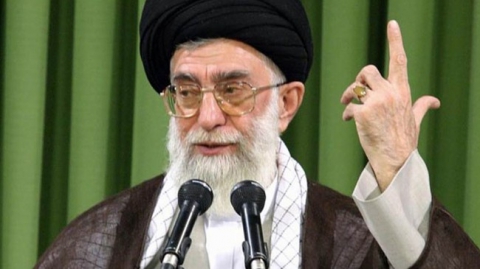 Iran’s top leader warned voters on Wednesday the West was plotting to influence elections pitting centrists close to President Hassan Rouhani against conservative hardliners in a contest that could shape the Islamic Republic for years to come.
Iran’s top leader warned voters on Wednesday the West was plotting to influence elections pitting centrists close to President Hassan Rouhani against conservative hardliners in a contest that could shape the Islamic Republic for years to come.
In remarks reflecting an abiding mistrust of Rouhani’s rapprochement with the West, Supreme Leader Ayatollah Ali Khamenei said he was confident Iranians would vote in favor of keeping Iran’s anti-Western stance on Friday in the first elections since last year’s nuclear accord with world powers.
Rouhani’s allies, who hope the deal will hasten Iran’s opening up to the world after years of sanctions, have come under increasing pressure in the election campaign from hardliners who accuse them of links to Western powers including the United States and Britain.
Those accusations seek to tap into Iranians’ wariness of Western motives and memories of a 1953 coup against nationalist prime minister Mohammad Mossadegh that was orchestrated by the United States and Britain and strengthened the Shah’s rule.
Rouhani on Wednesday denied accusations from hardliners that the candidates close to him were affiliated with Western powers, calling it an insult to the intelligence of Iranians.
In remarks on his official website, Khamenei was quoted as saying he was certain the United States had concocted a plot after the nuclear deal to “infiltrate” the Islamic Republic.
“When I talked about a U.S. infiltration plot, it made some people in the country frustrated,” said the Shi’ite clerical leader, who has final say on all major state policy in Iran.
“INFILTRATION”
“They complain (about) why we talk about infiltration all the time … But this is a real plot. Sometimes even the infiltrators don’t know they are a part of it,” he said.
“One of the enemy’s ruses is to portray a false dichotomy between a pro-government and anti-government parliament,” Khamenei was quoted as saying by state news agency IRNA.
“The nation does not want a pro- or anti-government parliament, but rather a strong and faithful parliament that is aware of its duties and is not intimidated by the United States,” he said at a rally in the city of Najafabad.
Supporters of Rouhani, buoyed by Iran’s nuclear deal, aim to gain influence in the elections for the 290-seat parliament and the 88-member Assembly of Experts, which will choose the country’s next supreme leader.
But potential detente with the West has alarmed hardliners, who have seen a flood of European trade and investment delegations arrive in Tehran to discuss possible deals in the wake of the nuclear agreement.
Since then, hardline security officials have arrested dozens of artists, journalists and businessmen, including Iranians holding joint U.S. or British citizenship, as part of a crackdown on “Western infiltration”.
Rouhani had criticized the arrests before, saying some “play with the infiltration word” to pursue their own political goals.
Moves by hardliners to block moderate candidates and portray them as stooges of the West have soured the mood in the final days of campaigning, and Rouhani complained on Wednesday of a public discourse rife with “abuse, accusations and insults”.
Addressing political activists, former president Hashemi Rafsanjani, one of Rouhani’s most powerful allies, said Rouhani’s election in 2013 “was Iranians’ first step to bring the country back to a path of moderation”.
“I hope people take the second step in Friday’s elections,” he said.
In an apparent reference to hardliners’ accusations that moderates were under Western influence, Rafsanjani said in a statement published on ISNA news agency: “Labeling rivals, in order to turn people’s hopes into despair, has no results.”
“The Iranians … will prove that they are seeking Iran’s political independence and will say no to colonialism, extremism and tyranny.”
Rouhani has called for a high turnout, even though half of the candidates, mostly moderates and reformists, were disqualified by a hardline watchdog body, the Guardian Council.
Rouhani’s government signed a deal with six powers including the United States last July under which Iran curbed nuclear activities that might have been applied to developing atom bombs, and secured a lifting of economic sanctions in return.
REUTERS

Leave a Reply
You must be logged in to post a comment.